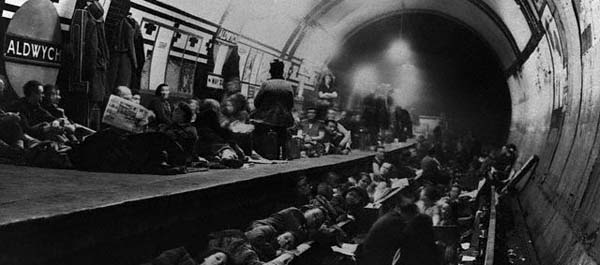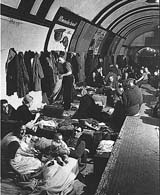Auld Lang Syne: The Death of a Citizen Soldier and Poet

Each of us has a few special people who come into our lives and because of their presence and their friendship make a difference. We prize them not only for the bonds we create with them but also for those occasional moments that are impossible to define but which are instinctively singular.
Such a very special friend died a few weeks ago. His death was not only sudden but came with the realization that with his passing I had lost a part of myself as well. His name was Harry Brack and those of you who happen to peruse my recent book about Winston Churchill will find his name inscribed on the dedication page.
{default}Harry was a child of World War II, who grew up in London’s East End. He was also a survivor of the Blitz that devastated much of the city. During several of our many wonderful conversations over the years he would sometimes recount the nights he spent in the London Underground, the great transportation hub that became a giant air raid shelter for the citizenry of London during the war.
 The imminent arrival of the Luftwaffe would be marked by the wail of air raid sirens blasting warnings to seek immediate shelter. One night, during a succession of nightly air raids, the sirens went off. It was the signal for Harry and his best friend to head for shelter in the London Underground, where thousands sat out the almost nightly air raids. It was not uncommon for as many as 177,000 Londoners to seek shelter in the Underground. But on this night for reasons he never fathomed his friend balked, stubbornly saying he was tired of spending the night on a jam-packed subway platform and would instead remain in his home. Harry tried without success to persuade his friend to change his mind before descending into a nearby station. My recollection is that he too was tempted by his friend’s belief in his immortality. His decision to seek shelter would prove life-altering.
The imminent arrival of the Luftwaffe would be marked by the wail of air raid sirens blasting warnings to seek immediate shelter. One night, during a succession of nightly air raids, the sirens went off. It was the signal for Harry and his best friend to head for shelter in the London Underground, where thousands sat out the almost nightly air raids. It was not uncommon for as many as 177,000 Londoners to seek shelter in the Underground. But on this night for reasons he never fathomed his friend balked, stubbornly saying he was tired of spending the night on a jam-packed subway platform and would instead remain in his home. Harry tried without success to persuade his friend to change his mind before descending into a nearby station. My recollection is that he too was tempted by his friend’s belief in his immortality. His decision to seek shelter would prove life-altering.
The following morning when he emerged into the daylight Harry found only devastation and a smoking ruin where his friend’s home had once stood. It had taken a direct hit from a German bomb and nothing remained but a giant crater. It was an image that decades later remained as fresh in his mind as it had been on that awful day when his friend died. His deadly World War II experiences taught him a lot about the frailty of life.
As a young man not long after the war Harry was summoned to serve his country as a citizen soldier in the postwar British army in Egypt. Although he didn’t much care for the life of an ordinary private soldier he served his required time with honor, using the time to travel to Israel, the land of his ancestors.
After completing his military service Harry trained as a chartered surveyor and during a long and highly successful career in London later formed and ran his own business. His natural curiosity and interest in making the world a better place led to a parallel career as an elected counselor in the London Borough of Islington.
During his life Harry was many things: writer, poet, soldier, bon vivant, successful businessman, a politician (in the true meaning as one who cared more about doing the right thing than keeping his job), possessed of an intellect that I envied, and someone who thought everyone should have an understanding of the importance of history.
But above all these wonderful qualities, Harry was a friend with whom I had a special bond. We first met in the late 1970s when I purchased his country home in East Anglia. I was then a US Army officer stationed in England and nearing the end of my military career. During my many trips to England and my time based there I had fallen in love with the country and decided to make it my permanent home. After coming across an advert in Country Life magazine for a country home I ended up buying the place from Harry. That is when I received my first awareness of his generosity when he sold us many of the home’s furnishings but graciously accepted payments whenever I could make them. We saw each other occasionally but it was not until several years later that I got an opportunity to really get to know Harry.
Eventually I had to sell the property and return to the States but we kept in touch with one another and when I began making research trips to England in connection with my writing Harry would always invite me to come and stay with him. I did so because it was difficult making ends meet on the pittances paid by my publishers but more importantly it was because being with Harry was just such a great pleasure. He challenged me intellectually, encouraged me in my work at times when I felt my writing was at a dead-end. He took me places I’d never otherwise see or experience. He was always full of great and often grand ideas and suggestions for things I could or ought to do to promote my books. When I began to write about Churchill, it was Harry who thought ahead and insisted that my publisher should launch the book at – where else – but Blenheim Palace – a wonderful idea that my London publisher sadly failed to embrace.
By happenstance I was not only around during the good times and also during one of the bad – the day an electrical malfunction started a fire that nearly consumed his London flat. Even something that traumatic failed to discourage him. I thought it prudent to move on after the fire, believing that the last thing Harry needed was to have me around as a burden while he found temporary accommodations and dealt with his insurance company and the restoration of his flat. Instead, he insisted in his usual persuasive way that I stay on, and I did.
Becoming a small part of Harry’s life every year or so was even more rewarding when he introduced to me one of the kindest, sweetest women I’ve ever met: Sue, the great lady who later became his wife.
Harry was one of those rare people who, once he became your friend, could never do enough. I loved his sense of style, and his superb taste in books and music were a reflection of his curiosity about life and the world, as was the elegant yet simple way he furnished his homes. I’ve always regarded him as the most well read man I’ve ever known.
Harry always lived life in a way I envy. He had that special joie de vivre that is bestowed on only a few. That also included his driving, which was often an experience of sheer terror for his passengers. I always thought that the Gods especially looked after Harry every time he got behind the wheel of an automobile. Whenever I rode with him I offered them a nod of thanks when we would arrive at our destination in one piece. Many were the occasions when, to my immense relief Sue would gently dissuade him in order to take up the driving duties. Yet, Harry’s admittedly scary driving habits were a microcosm of how he lived his life, with l’audace. It was as if he was throwing down a gauntlet as if to say: “Out of my way, I have important places to go and things to do.”
Through my tears at his loss is my joy that I can proudly say that knowing him was a gift and a blessing. As a rule, men don’t bond terribly well but with Harry I always felt a special link unlike any other I’ve ever experienced. Even as we celebrate his life I am ever thankful that my wife and I were a small part of a rich life lived to its fullest.
In a corner of our property we have created a small garden in his memory. The flowers will bloom year after year to remind us of his eternal friendship, which lives on forever.
Harry, wherever you are, I am comforted by the belief that one day we’ll meet again to toast and to share old memories and make new ones. He enriched my life beyond measure and made me proud to call him my friend.
In retirement, he began writing poetry that reflected his varied interests and his compassion for mankind. Here is one of his poems.
Twisting in the Wind
Twisting, turning
At the whim of each gust
A leaf, once proud
And green, hanging
From a branch of some
Familiar tree, rooted
In English soil. Now
Golden brown, floating
Down to earth’s embrace,
Obeying the iron law
Of birth, life, death
And resurrection

